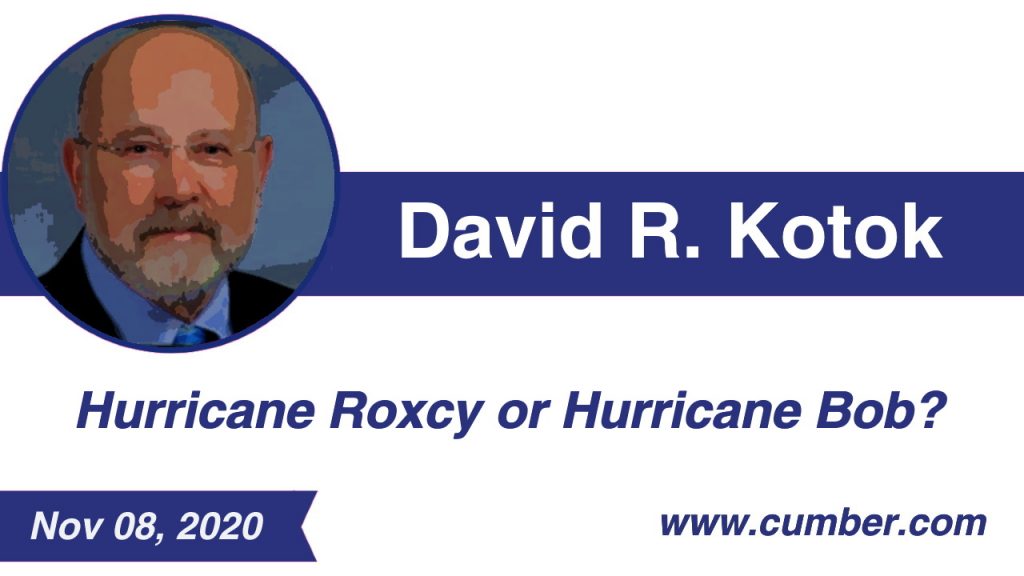“Biden’s proposals to increase taxes on the wealthy and corporations – not to mention a $2 trillion plan to fight climate change – would stand virtually no chance in a Mitch McConnell-led Republican Senate” (https://www.bloomberg.com/news/newsletters/2020-11-05/a-biden-agenda-might-stall-before-it-starts). Let’s devote Sunday to the climate.
Climate change is a big agenda item for Biden & Co. But a gridlocked government makes climate change and mitigation measures much harder to advance at the federal level. The issues are enormous and global. Oil, gas, coal, drilling, fracking, pipelines, nuclear power – the list goes on and on. Cumberland has been and continues to be overweight solar, wind, and water power. There has been some correction in those ETF prices, and we may use pullbacks to rebalance and/or add to those positions.
Meanwhile the drama of global warming and its effects ignores the political outcomes. No matter what, the planet is getting hotter; the hurricanes are getting stronger; the melting of ice is accelerating; sea levels are rising; and the air is getting more carbon-laden. So the politics represent just the shorter-term cycles of what we do or don’t do, though these cycles will drive the intensity of the changes and the outcomes and the costs we incur. Mother Nature doesn’t vote in our elections. Mother Nature proceeds on a path to the outcome of a trend that has been underway for a century and is accelerating.
We want to introduce the Climate Adaptation Center, which is now up and running and open for business. The CAC is headquartered in Sarasota. CEO and Chairman Bob Bunting is known to many of our readers. He is taking the CAC into full-blown operations and is focused on the adaptation to climate change effects in Florida. Florida has a $7 trillion coastline risk exposure to rising sea levels. Florida has red tide on the Gulf of Mexico side. Here is the CAC new website: https://www.theclimateadaptationcenter.org. We invite readers to take a few minutes to review it and to sign up for their email notices. We already have.
We will be doing an interview with Bob Bunting and also running a guest piece for our readers. We’ve asked Bob why hurricanes are intensifying and why we are seeing more and more weather records broken. His comments will be forthcoming.
Now, let’s segue to a snippet of history.
At Cumberland, we use hurricane data and climate change information as part of our evaluation of municipal credit. John Mousseau and I first did that many years ago when we had to plot hurricane path “cones of uncertainty” on maps by hand. Electronic information analysis has now replaced that process, and credit work now includes climate risk.
John and I recommend a marvelous book by Eric Jay Dolin called A Furious Sky: The Five-Hundred-Year History of America's Hurricanes (https://smile.amazon.com/dp/B07ZTTHPB8/ref=smi_www_rco2_go_smi_g4368549507?_encoding=UTF8&btkr=1&ie=UTF8). Readers will learn about the first recorded hurricane to impact American history. That storm altered the history of what is now Florida’s east coast back in the 1500s. The French colony near present-day Jacksonville was badly damaged by the storm, losing men, ships, and supplies. The Spanish colony, St. Augustine, fared better. An ensuing battle resulted in a French loss. That is how Florida’s Spanish history started, many decades before Plymouth Mass and Jamestown VA were founded.
One more note. Hurricanes have had nicknames for over a century. There is a storied history about how they were named. After World War 2, they came to be named for women, a practice that continued until the 1970s, when Roxcy Bolton, a Miami activist who was an early member of the National Organization for Women, pressured the National Weather Service to drop its gendered hurricane-naming system. She suggested that the storms be named instead for US senators, who, she said, “delight in having things named after them” (http://werehistory.org/roxcy-bolton/). Here’s a quote on Bolton from Dolin’s marvelous book (pp. 208–9):
“Two years later, Bolton gave priority to the cause of compelling the National Weather Service to stop. The obviously gendered and misogynistic way in which hurricanes were discussed in the press, on radio, and on television infuriated her. She was tired of reading and hearing media accounts in which female-named hurricanes were variously described as ‘witches,’ ‘capricious,’ ‘furious,’ ‘savage,’ ‘bad girls,’ ‘unladylike,’ ‘vicious,’ ‘erratic,’ ‘eccentric,’ ‘treacherous,’ a ‘lust,’ and ‘acting like a woman in labor,’ to name just a few of the aspersions.”
The National Weather Service and the World Meteorological Association finally ended the gendered practice in 1979, when it adopted the practice of alternating men’s and women’s names; and so the second hurricane that year was called Bob (https://www.americannamesociety.org/roxcy-bolton-feminist-crusader-for-equality-including-in-naming-hurricanes-dies-at-90/).
We recommend the book and will leave the rest of this extraordinary story to inquisitive readers.
Happy Sunday
David R. Kotok
Chairman of the Board & Chief Investment Officer
Email | Bio
Originally published via MailChimp: Check it out.
Links to other websites or electronic media controlled or offered by Third-Parties (non-affiliates of Cumberland Advisors) are provided only as a reference and courtesy to our users. Cumberland Advisors has no control over such websites, does not recommend or endorse any opinions, ideas, products, information, or content of such sites, and makes no warranties as to the accuracy, completeness, reliability or suitability of their content. Cumberland Advisors hereby disclaims liability for any information, materials, products or services posted or offered at any of the Third-Party websites. The Third-Party may have a privacy and/or security policy different from that of Cumberland Advisors. Therefore, please refer to the specific privacy and security policies of the Third-Party when accessing their websites.
Sign up for our FREE Cumberland Market Commentaries
Cumberland Advisors Market Commentaries offer insights and analysis on upcoming, important economic issues that potentially impact global financial markets. Our team shares their thinking on global economic developments, market news and other factors that often influence investment opportunities and strategies.


